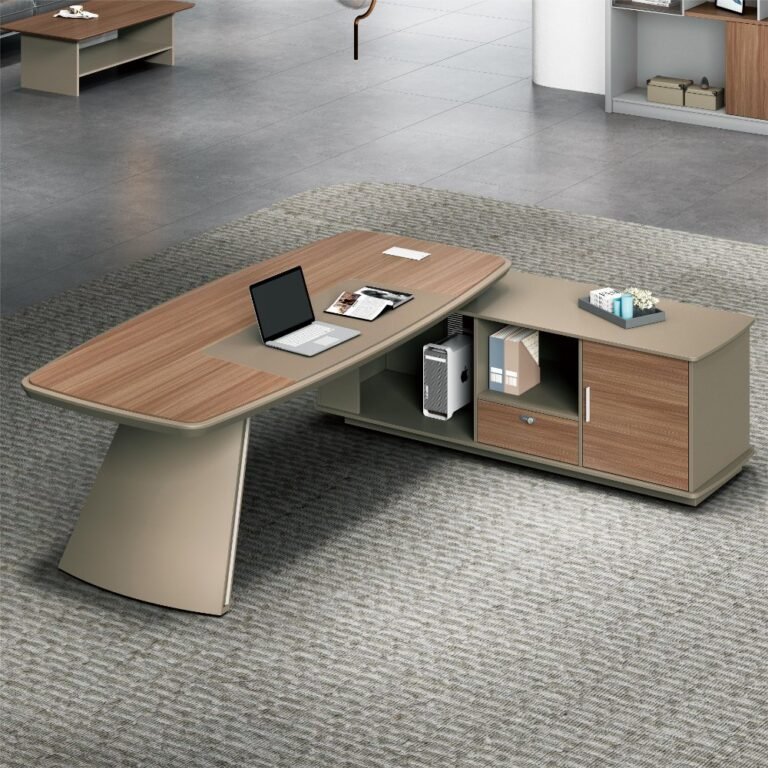In the modern workplace, the quest for sustainability has become a top priority. As we strive to reduce our carbon footprint and promote a healthier planet, the manufacturing practices of office chairs have come under scrutiny. This blog post delves into the eco-friendly practices adopted by various companies in the production of office chairs, highlighting the importance of sustainable materials, energy-efficient processes, and a circular economy approach.
Introduction
The office chair, a staple in the corporate environment, has traditionally been manufactured with little regard for its environmental impact. However, with the rise of eco-conscious consumers and the need for corporate social responsibility, manufacturers are now reevaluating their practices. The shift towards eco-friendly office chair manufacturing is not just a trend but a necessary evolution for the industry.
The Importance of Sustainable Materials
The first step towards eco-friendly office chair manufacturing is the selection of sustainable materials. Traditional office chairs often contain materials that are harmful to the environment, such as PVC and non-recycled plastics. In contrast, sustainable materials not only reduce the environmental impact but also contribute to creating a healthier workspace.
Recycled Materials
One of the most significant moves towards sustainability is the use of recycled materials. Companies like Branch and Emeco have made it a priority to incorporate recycled materials into their office chairs. For instance, Emeco’s iconic 1006 Navy Chair is made primarily from recycled aluminum, a practice that has been upheld since 1944 and continues to this day with their 111 Navy Chair, which also utilizes recycled PET bottles.
Bio-based Materials
Bio-based materials are another key component in the sustainable office chair manufacturing process. KUSKOA BI, for example, has created an eco-friendly chair using a bio-plastic derived from 100% plant-based, renewable resources. This approach not only reduces the reliance on petroleum-based plastics but also lessens the environmental impact of the chair’s production.
Forest Stewardship Council (FSC) Certified Wood
The use of FSC-certified wood is a mark of responsible forestry practices. Companies like What WE Make and Urban Wood Goods source their wood from sustainably managed forests, ensuring that the wood used in their office chairs comes from a renewable and responsibly managed source.
Energy-Efficient Manufacturing Processes
Sustainable office chair manufacturing is not just about the materials used but also the processes involved. Energy-efficient practices in manufacturing can significantly reduce the carbon footprint of the production process.
Minimizing Waste
Manufacturers are adopting practices that minimize waste during the production process. This includes recycling programs, using low VOC (volatile organic compound) finishes, and reducing water and energy consumption. For example, Emeco’s LEED-certified manufacturing facility uses renewable energy and energy-efficient fixtures, demonstrating a commitment to reducing the environmental impact of their operations.
Durability and Longevity
Creating office chairs that are built to last is another fundamental principle of sustainability. High-quality craftsmanship and durable materials ensure that the chairs maintain their functionality over time, reducing the need for frequent replacements. This approach not only saves resources but also aligns with the concept of a circular economy, where products are designed to be reused, recycled, or repurposed.
The Circular Economy and Recyclability
The circular economy is a key concept in sustainable office chair manufacturing. It emphasizes the design, use, reuse, and recycling of products to minimize waste and pollution. Office chairs that are designed for disassembly and recycling at the end of their life cycle contribute to this model.
Recyclable Components
Office chairs with recyclable components, such as those from Humanscale, are a step towards a circular economy. The Liberty Ocean Chair, for example, is made using reclaimed fishing nets and is part of Humanscale’s ‘Ocean’ chair series, which is certified net positive, meaning it improves the planet through comprehensive strategies covering energy and water usage, material sourcing, and manufacturing processes.
Cradle-to-Cradle Design
The cradle-to-cradle (C2C) design framework is another approach that promotes sustainability. Andreu World, a global furniture company, adheres to this philosophy, ensuring that their products are designed to be recycled or composted at the end of their life cycle. Their products are certified under the C2C standard, which evaluates components based on environmental and human health, recyclability, and the manufacturing process.
Ethical Supply Chain and Labor Practices
A truly sustainable office chair manufacturing process extends beyond the materials and production methods to include ethical supply chain and labor practices.
Fair Labor and Wages
Companies like Branch and Emeco are committed to ensuring fair wages and safe working conditions throughout their supply chain. This commitment to ethical labor practices is a vital aspect of sustainability, as it respects the dignity and well-being of the workers involved in the production process.
Transparency and Accountability
Transparency in sourcing and manufacturing practices is essential for building trust with consumers. Companies that are open about their supply chains and labor practices, like Noho, which is a Public Benefit Corporation and Certified B Corp, demonstrate a commitment to social and environmental responsibility.
Carbon Commitments and Green Practices
Reducing carbon emissions is a critical aspect of sustainable office chair manufacturing. Companies are taking steps to minimize their ecological footprint through various green practices.
Renewable Energy Use
The use of renewable energy in manufacturing facilities is one way companies are reducing their carbon emissions. Emeco’s manufacturing facility, for example, uses renewable energy sources, contributing to a lower carbon footprint.
Life-Cycle Assessment
A life-cycle assessment (LCA) is a technique used to evaluate the environmental impact of a product from raw material extraction to end-of-life disposal. Companies that conduct LCAs, like Humanscale, are able to identify areas for improvement and make data-driven decisions to reduce their environmental impact.
The shift towards eco-friendly office chair manufacturing is a testament to the growing awareness of the need for sustainable business practices. By adopting sustainable materials, energy-efficient processes, and a circular economy approach, manufacturers are not only reducing their environmental impact but also meeting the demands of an increasingly eco-conscious consumer base. As we move towards a more sustainable future, the office chair will continue to evolve, reflecting our commitment to both comfort and the health of our planet.


